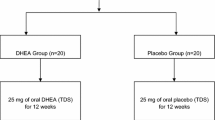Abstract
Purpose
Dehydroepiandrosterone (DHEA) is often prescribed for poor responders in IVF in an effort to improve response to ovarian stimulation. The effect of DHEA supplementation and resultant supraphysiologic DHEA-S serum levels on sex steroid assays has not been evaluated in this population. This study seeks to determine the relationship between DHEA supplementation and progesterone measurements to characterize the degree of interference with particular immunoassays.
Methods
Characterization was accomplished in two phases. First, DHEA-S standard control reagents with no progesterone present were assayed for both DHEA-S and progesterone levels. Second, serum pools from 60 unique IVF patients’ serum were used to create six pooled serum samples: three from patients on DHEA supplementation and three from patients not on DHEA supplementation. The three pools were composed of patients whose serum fell into low, medium, and high progesterone ranges. Baseline DHEA-S and progesterone were measured, and the mean level of DHEA-S in the mid-range progesterone pool was used as the mid-point for addition of DHEA-S standard to the serum pools from patients without DHEA supplementation. Progesterone from these pools was then measured on three commercially available immunoassay systems.
Results
The first experiment revealed a linear increase in progesterone when analyzing the DHEA-S standard ranging from 0.5 ng/mL in the blank control (no DHEA-S) to up to 2.0 ng/mL in the high control (DHEA-S >700 μg/mL), indicating that the DHEA-S cross-reacts with the progesterone assays. In the second experiment, patients’ serum DHEA-S and progesterone were measured from pooled serum samples of those taking DHEA and those not taking DHEA. Adding DHEA-S to the pooled serum of those not taking DHEA resulted in a linear increase in progesterone levels on two of three commercially available immunoassays (p < 0.05).
Conclusions
DHEA-S can interfere with standard progesterone immunoassays used in clinical ART programs, and thus serum progesterone levels in IVF patients on DHEA supplementation may not reflect truly bioactive progesterone.


Similar content being viewed by others
References
Narkwichean A, Maalouf W, Campbell BK, Jayaprakasan K. Efficacy of dehydroepiandrosterone to improve ovarian response in women with diminished ovarian reserve: a meta-analysis. Reprod Biol Endocrinol. 2013;11:44.
Casson PR, Lindsay MS, Pisarska MD, Carson SA, Buster JE. Dehydroepiandrosterone supplementation augments ovarian stimulation in poor responders: a case series. Hum Reprod. 2000;15:2129–32.
Patrizio P, Vaiarelli A, Levi Setti PE, Tobler KJ, Shoham Z, Leong M, et al. How to define, diagnose and treat poor responders? Responses from a worldwide survey of IVF clinics. Reprod Biomed On. 2015;30(6):581–92.
Weissman A, Horowitz E, Ravhon A, Levran D. Administration of DHEA augments progesterone production in a woman with low ovarian reserve being transplanted with cryopreserved ovarian tissue. J Assist Reprod Genet. 2014;31(11):1565.
Strauss S, Greve T, Ernst E, Fraidakis M, Grudzinskas JG, Andersen CY. Administration of DHEA augments progesterone production in a woman with low ovarian reserve being transplanted with cryopreserved ovarian tissue. J Assist Reprod Genet. 2014;31(6):645–9.
Bosch E, Labarta E, Crespo J, Simon C, Remohi J, Jenkins J, et al. Circulating progesterone levels and ongoing pregnancy rates in controlled ovarian stimulation cycles for in vitro fertilization: analysis of over 4000 cycles. Hum Reprod. 2010;25:2092–100.
Silverberg KM, Burns WN, Olive DL, Riehl RM, Schenken RS. Serum progesterone levels predict success of in vitro fertilization/embryo transfer in patients stimulated with leuprolide acetate and human menopausal gonadotropins. J Clin Endocrinol Metab. 1991;73(4):797–803.
Shapiro BS, Daneshmand ST, Garner FC, Aguirre M, Hudson C, Thomas S. Embryo cryopreservation rescues cycles with premature luteinization. Fertil Steril. 2010;93(2):636–41.
Weissman A, Horowitz E, Ravhon A, Golan A, Levran D. Dehydroepiandrosterone supplementation increases baseline follicular phase progesterone levels. Gynecol Endocrinol. 2011;27(12):1014–7.
Genazzani AR, Inglese S, Lombardi I, Pieri M, Bernardi F, Genazzani AD, et al. Long-term low-dose dehydroepiandrosterone replacement therapy in aging males with partial androgen deficiency. Aging Male. 2004;7(2):133–43.
Marc A, Fritz Speroff L. Clinical gynecologic endocrinology and infertility. Philadelphia: Lippincott Williams and Wilkins; 2010. p. 29–50.
Venetis CA, Kolibianakis EM, Papanikolaou E, Bontis J, Devroey P, Tarlatzis BC. Is progesterone elevation on the day of human chorionic gonadotrophin administration associated with the probability of pregnancy in in vitro fertilization? A systematic review and meta-analysis. Hum Reprod Update. 2007;13:343–55.
Research and Markets. In Vitro Diagnostics (POC/Rapid diagnostics) Global market—Forecast to 2020. 2015.
Author information
Authors and Affiliations
Corresponding author
Additional information
Capsule
DHEA-S can interfere with standard progesterone immunoassays used in clinical ART programs, and thus serum progesterone levels in IVF patients on DHEA supplementation may not reflect truly bioactive progesterone.
An erratum to this article is available at http://dx.doi.org/10.1007/s10815-017-0934-2.
Rights and permissions
About this article
Cite this article
Franasiak, J.M., Thomas, S., Ng, S. et al. Dehydroepiandrosterone (DHEA) supplementation results in supraphysiologic DHEA-S serum levels and progesterone assay interference that may impact clinical management in IVF. J Assist Reprod Genet 33, 387–391 (2016). https://doi.org/10.1007/s10815-016-0650-3
Received:
Accepted:
Published:
Issue Date:
DOI: https://doi.org/10.1007/s10815-016-0650-3




